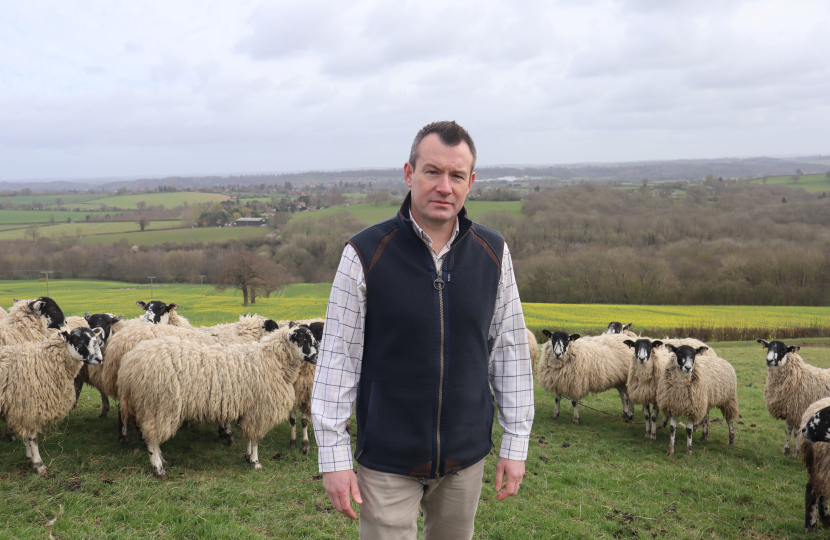
Stuart Anderson MP fights back against cruel family farm tax
Stuart Anderson MP has said that the government has betrayed South Shropshire’s hard-working farming families. It follows the announcement, at the Autumn Budget on Wednesday 30th October, that, from April 2026, the rate of Agricultural Property Relief (APR) and Business Property Relief (BPR) after the first £1 million on combined agricultural and business will be reduced to 50%. It means 20% Inheritance Tax will be charged on estates containing business and agricultural assets worth more than £1 million.
Stuart has criticised the decision, adding that the new government had previously committed to keeping the support for farmers in place. In November 2023, Environment Secretary Steve Reed told the Country Land and Business Association (CLA) that: “we have no intention of changing APR.” In December 2023, he then repeated the same commitment to the National Farmers’ Union (NFU). He has now said that farmers will have to “learn to do more with less". The new government’s manifesto had also committed to only one change in relation to Inheritance Tax – ‘we will end the use of offshore trusts to avoid inheritance tax..."
Shropshire has the highest number of farm holdings in England per county, forming nearly 20% of enterprises. Ahead of the Budget, Stuart had called on the government to rule out any changes to the reliefs. He warned that doing so could lead to the closure of many family farms, threatening national food security. He has now urged the government to rethink these plans, after Keir Starmer said in February 2024 his government would listen to farmers and be one that “heeds early warnings.”
The reliefs had ensured that family farms had the confidence to make long-term decisions. They had enabled them to be handed down to future generations for free of charge, so that future generations could carry on producing food and delivering environmental benefits after the death of a farmer. Without them, it is highly likely that farms will need to be split up and sold. The Country Land and Business Association (CLA) has warned that capping agricultural property relief at £1 million could harm 70,000 UK farms.

Although the government said the policy will "target larger estates", the reformed relief would only cover farms of up to 67 acres - as farmland is valued at an average of £10,000 per acre. For context, the average farm size in England is 217 acres - valuing the land alone at £2.17 million. It could result in 70,000 farms receiving bills for £293,220. Average farm business income was £96,100 in 2022/23. It means the cap will hurt agricultural businesses that are asset-rich but cash-poor, with knock-on effects being anticipated on business investment and, in some cases, the viability of the whole operation on transfer after death.
With the change subject to primary legislation, Stuart said there is still time for the government to rethink its plans ahead of April 2026. The government has also said that it will review funding spent on flood defences and farm schemes from 2025-26 "to ensure they are affordable", although they had been endorsed as 'world-leading'. The Royal Society for the Protection of Bird (RSPB) has warned that even a £100 million cut would equate to 239,000 fewer hectares of nature-friendly farmland.
In his response to the Budget, Stuart said that this decision would be short-sighted - having warned in September that such cuts would risk national food security. The government has also been warned that the policy could result in higher food prices. The price of a loose aubergine or a cucumber could go up by 20p, while packs of peppers could rise by 35p. It comes as the Office for Budget Responsibility (OBR) confirmed the Budget has taken the tax burden to 38.2 per cent of GDP in 2028-29, exceeding the record high set in 1948 which was 37 per cent of GDP.
Stuart Anderson MP said:
“When Keir Starmer told the National Farmers’ Union that every day brings a ‘new existential risk’ to farmers, we didn’t realise that this was his vision for Britain under his premiership. In one fell swoop, his Chancellor has risked national food security and broken the promises previously made to farmers. With the highest number of farms per county in England, this decision will be disastrous for Shropshire. Unlike this new government, I am proud to back our hard-working farming families. I call upon the new government to rethink its plans. I will fight this family farm tax at every step of the way and I hope that everyone will sign our petition to let the government know our strength of feeling on this cruel policy that is being imposed on us.”
Sign our petition to stop the family farm tax here: stopthefarmtax.com.






